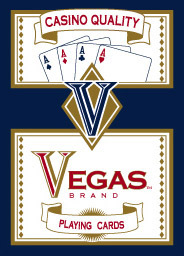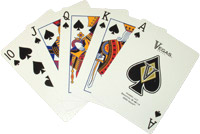Citable No. 53: TTAB Deals "VEGAS" Playing Card Applicant Winning Hand in 2(a), 2(e)(2), and 2(e)(3) Opposition
In its 53rd citable decision of 2006, the Board dismissed an opposition to registration of the mark VEGAS for playing cards, ruling that Opposer United States Playing Card Company had failed to prove its claims that the mark is deceptive (Section 2(a)), primarily geographically descriptive (2(e)(2)), or primarily geographically deceptively misdescriptive (2(e)(3)). United States Playing Card Co. v. Harbro, LLC, 81 USPQ2d 1537 (TTAB 2006).

The Board quickly disposed of the Section 2(e)(2) descriptiveness claim because Opposer did not try to prove that Applicant's playing cards are made or sold in Las Vegas. In fact, Applicant's cards are made in China, and Applicant is located in Michigan.
As to the Section 2(a) deceptiveness claim, the CAFC held in In re California Innovations Inc., 66 USPQ2d 1853 (Fed. Cir. 2003), that the test for determining whether a mark is geographically deceptive under Section 2(a) is the same as the test under Section 2(e)(3), and that the deceptiveness of a geographical term should be considered under Section 2(e)(3). This test focuses on the deception of, or fraud on, the consumer; an opposer must prove that the goods-place association made by the consumer is material to the decision to purchase the goods.
Here, the Board found that VEGAS is an abbreviation for LAS VEGAS, a generally known geographic location. Opposer "submitted evidence sufficient to prove that Las Vegas is well-known for, inter alia, casinos and gambling." Because of this association and the association of gambling with playing cards, "consumers may associate playing cards with Las Vegas." Consequently, the Board concluded that there is a goods-place association between playing cards and Las Vegas.

Opposer, however, failed to satisfy the third prong of the test: a showing "that the misleading goods-place association is a material factor in the customer's decision to purchase applicant's playing cards." Opposer argued that it met this requirement by proving "that there is a market for canceled casino cards from Las Vegas casinos." Moreover, Opposer asserted, materiality may be inferred because there is a "heightened" goods-place association here.
The Board was not persuaded. "Although the evidence demonstrates that consumers are interested in obtaining cards that were used in casinos, the evidence does not establish that they are interested in purchasing playing cards that were manufactured or used in Las Vegas."
The Board declined to draw an inference of materiality. The evidence showed that consumers purchase canceled casino cards because they were used in casinos, not because they were made or used in Las Vegas.
"We disagree with opposer's conclusion that 'the goods-place association between Las Vegas and playing cards is so strong that the Board may presume that the geographical connection between the place and the goods led to the consumer's decision to purchase the goods.' *** This is simply attorney argument without support in the record."
The Board therefore dismissed the opposition
Text Copyright John L. Welch 2006.




0 Comments:
Post a Comment
<< Home